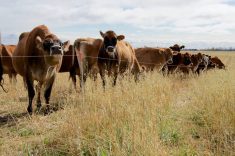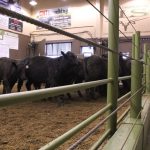CALGARY – An ideological line was drawn in the sand Oct. 15 when the long-awaited farmer-led court challenge against the Canadian Wheat Board began in the Federal Court of Canada.
The complaint, being heard in a Calgary courtroom, maintains that under the Charter of Rights and Freedoms, the Canadian Wheat Board as the only agency to which farmers can sell their wheat or malting barley, violates the economic rights of western Canadian farmers.
Keith Groves, the lawyer representing the plaintiffs, said the case may be akin to a royal commission investigating the right of a crown corporation to hold a monopoly.
Read Also

Bluefaced Leicester breed in a class all its own
The Bluefaced Leicester’s high-quality mothering skills and quality wool are some of the strong traits that make the breed a good addition to any operation.
However, wheat board lawyer Brian Hay of the federal justice department, said the lawsuit is close to failing as “a reasonable cause of action at law.”
Justice Francis Muldoon said during the opening minutes of the trial that the charter does not include property rights. But he added he was not about to dismiss the case the first day. Nor is he concerned with what federal agriculture minister Ralph Goodale or Parliament has to say about the Canadian Wheat Board Act because the statute is under challenge, not the opinion of politicians.
“The statute has outlived many ministers of the day,” said Muldoon.
Groves told the judge the plaintiffs represent a broad cross section of the farming community who want the right to sell their wheat to others besides the board.
“They are not asking for an unbridled free market,” Groves said in his opening statement.
Six farmer witnesses were heard last week. This week, industry experts like economist Colin Carter were scheduled to present evidence. The wheat board defence scheduled economist Daryl Kraft to testify in the final week.
Carter has written a critique of the board’s performance, saying it has missed lucrative sales. Kraft was part of a team of economists defending the sales agency’s work.
The farmers representing the plaintiffs include Brian Otto, Warner, Alta.; Tim Harvie, Cochrane, Alta.; Con Johnson, Bracken, Sask.; Ted Cawkwell, Nut Mountain, Sask.; Paul Orsak, Binscarth, Man.; and Rick Dobranksi, Roblin, Man.
Agriculture advancements
In their testimony Groves said the farmers would tell the court how their profession has changed in the last 50 years.
Each producer explained how he farmed, how he sold grains and oilseeds as well as his qualifications as a farmer.
Saskatchewan farmer and past president of the barley growers association Ted Cawkwell explained how he, with a Grade 10 education, marketed a variety of crops which are not handled by the board.
Using the computerized Data Transmission Network, faxes and other private services available, he said these services help him make planting decisions a year ahead of time as well as sell crops like peas or canola for cash to the highest bidder.
When asked how he understood the workings of the grain industry so well, Cawkwell replied, “I’m a grain farmer. It’s my business to know.”

















